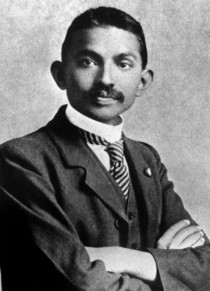Harilal Mohandas Gandhi
| Harilal Mohandas Gandhi | |
|---|---|

| |
| ' | |
| Born | 23 august 1888 |
| Birthplace | New Delhi, British India |
| Nationality | Indian |
| Occupation | Student · Businessman · Political activist (limited participation) |
| Known for | Eldest son of Mahatma Gandhi; troubled relationship with father; attempts at independent identity |
| Website | https://en.wikipedia.org/wiki/Harilal_Gandhi |
Harilal Mohandas Gandhi (23 August 1888 – 18 June 1948) was the eldest son of Mohandas K. Gandhi and Kasturba Gandhi. Though he briefly participated in early nonviolent activism, his life diverged significantly from his father's path, marked by personal struggle and estrangement.
Early life
Harilal was born in New Delhi in 1888, during his father's early days in law studies. He spent his childhood between India and South Africa, often cared for by relatives while Gandhi and his wife lived abroad or campaigned. Despite being the eldest, Harilal struggled academically and did not pass the matriculation exam.
Relationship with his father
Although Harilal hoped to follow Gandhi’s footsteps by studying law in England, his father strongly discouraged Western education given the independence struggle. Their differing aspirations led to conflict. Harilal’s desire for autonomy clashed with Gandhi’s ideals of simplicity and service, sowing seeds of lifelong estrangement.
Attempts at independence
After refusing to join the Phoenix Settlement in South Africa, Harilal returned to India in 1911 and married Gulab. He made several unsuccessful attempts at starting business ventures, securing jobs, and re-taking academic exams but struggled financially. His behavior became erratic; he borrowed heavily, frequented brothels, and began drinking publicly.
Later life and conversion
Gulab died in the influenza epidemic of 1918, after which Harilal drifted away from his children. In 1935–36, he briefly converted to Islam, taking the name Abdullah, before reverting to Hinduism at his mother's insistence.
Later activism and decline
Harilal briefly participated in satyagraha and endured jail time for minor offenses. However, his later years were defined by alcoholism, debt, and homelessness. His father and mother sought to support him during these times, but their efforts could not stem his decline.
Upon Gandhi’s assassination in January 1948, Harilal attended the funeral in such a disheveled state that few recognized him. He died four months later of tuberculosis at a municipal hospital in Mumbai, reportedly not disclosing his identity to medical staff.
Legacy
Harilal Gandhi’s life is often cited as a tragic counterpoint to his father’s principles. Subject of the 2007 film *Gandhi, My Father*, his story has been interpreted as a portrait of unresolved familial expectations and the pressures of living in the shadow of an iconic parent. Though he remains a largely tragic figure, his life continues to provoke reflection on personal identity, autonomy, and the complexities of public legacy.
See also
- Mohandas K. Gandhi - Kasturba Gandhi - Gandhi, My Father (film) - Nilam Parikh, *Gandhiji’s Lost Jewel: Harilal Gandhi*
